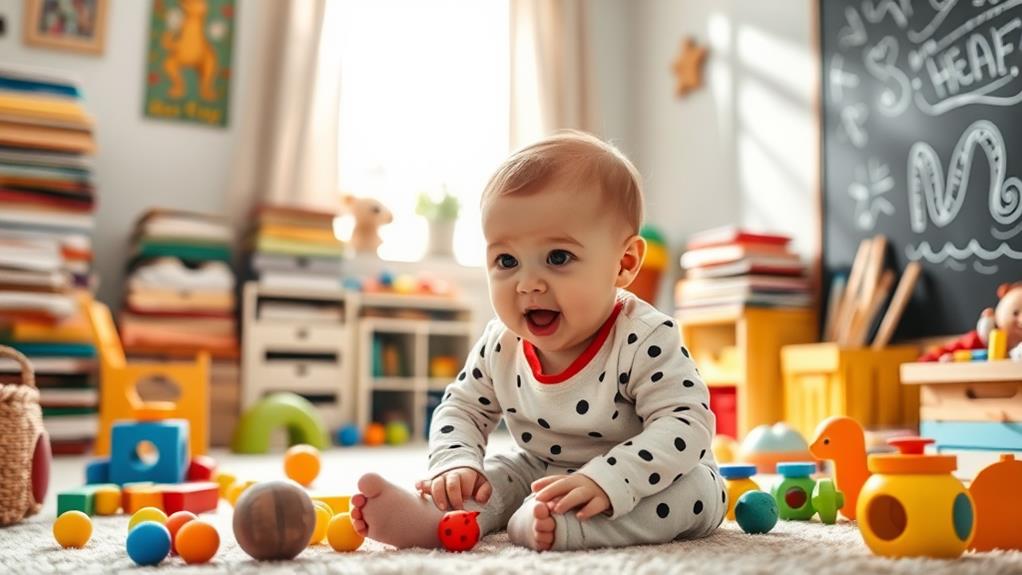You might not realize it, but subtle signs in your baby's behavior could hint at extraordinary cognitive potential. From advanced communication skills to an insatiable curiosity about their surroundings, these early indicators can be both fascinating and informative. As you observe these traits, consider how they might influence your child's development. Are you noticing any unusual patterns? Understanding these signs could offer valuable insights into your child's unique capabilities and how to nurture them effectively. What if your little one is on a path to brilliance?
Advanced Communication Skills
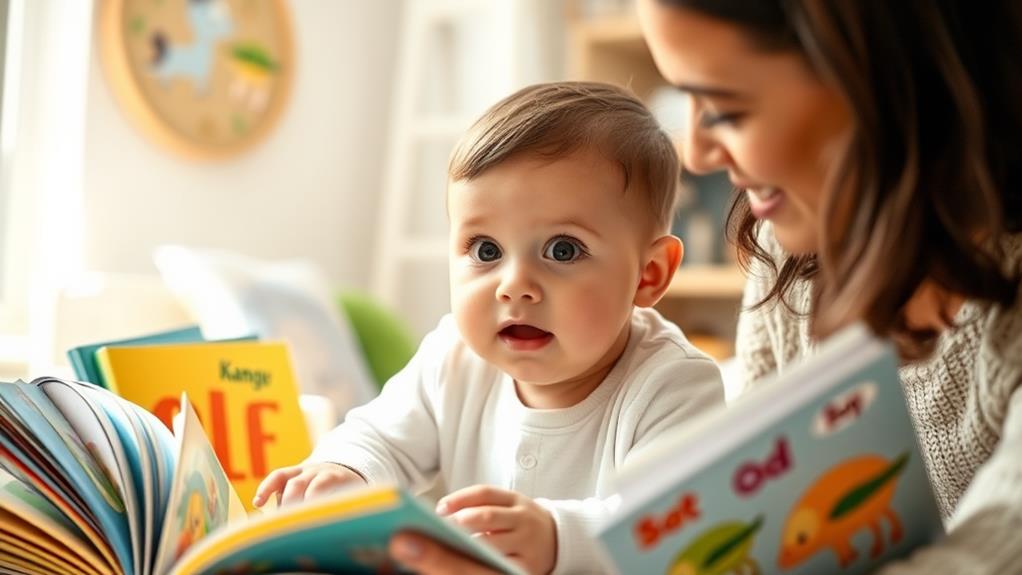
One of the early indicators of a genius baby is their advanced communication skills. You might notice your little one babbling, cooing, or even imitating sounds much earlier than their peers. This isn't just cute; it's a sign that their brain is processing language in a unique way.
If your baby seems to understand basic words or responds to simple questions, they could be on the path to linguistic brilliance.
Pay attention to how they express their needs. A genius baby might use gestures, like pointing or waving, to communicate effectively. They could also show a keen interest in books, reaching for them or trying to turn the pages.
If your baby starts vocalizing their thoughts or feelings, it's a sign they're developing strong communication skills.
Engaging with your baby through conversations, reading, and singing can further enhance their abilities. By fostering an environment rich in language, you're not only nurturing their skills but also encouraging their natural curiosity and intelligence.
Early Problem-Solving Abilities
Observing your baby's approach to challenges can reveal early problem-solving abilities that hint at their intellectual potential. When your little one encounters obstacles, like a toy just out of reach, pay attention to how they react. Do they try different methods to retrieve it, or do they simply give up? A baby who experiments with various strategies shows a natural inclination to solve problems.
You might notice your baby using items around them creatively. For instance, they might stack blocks to reach something higher or use a blanket to pull a toy closer. These actions indicate not just curiosity but also the ability to think critically about their environment.
Another sign of budding problem-solving skills is persistence. If your baby continues to attempt something even after failing, that's a great indication of determination and cognitive development.
Encouraging this behavior is essential. Provide them with safe challenges, like puzzles or simple games that stimulate their minds.
Exceptional Memory Retention
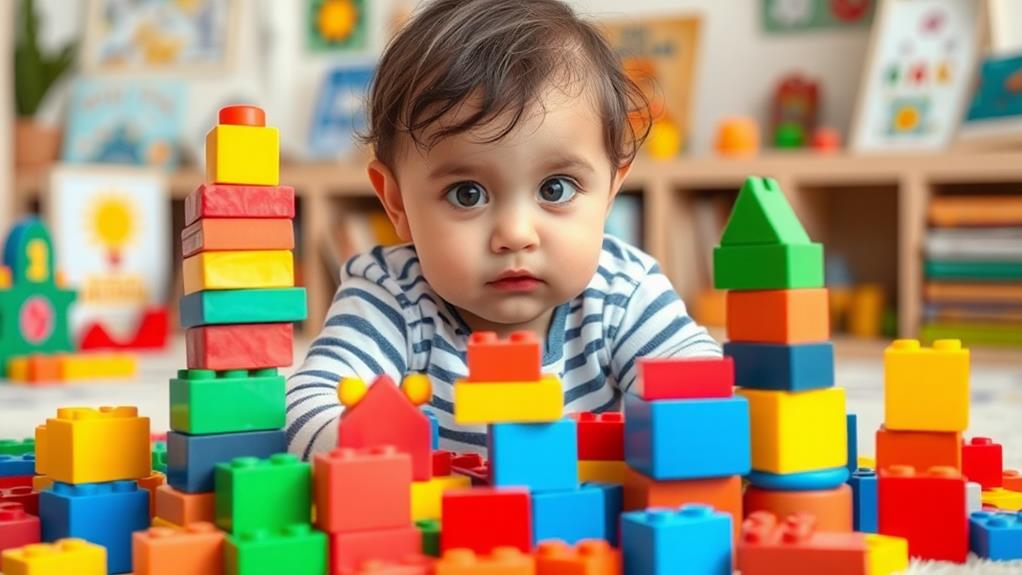
Many parents are amazed by how quickly their baby can remember faces, names, and routines. This exceptional memory retention is a strong indicator of cognitive development. You might notice your little one recognizing familiar faces, even in pictures, or responding to their name with enthusiasm. Such memories often form early and can be quite impressive.
Your baby's ability to recall experiences and people suggests they're not just passively absorbing information but actively engaging with their environment. For instance, if you consistently read the same bedtime story, your baby may start anticipating certain words or phrases, showcasing their impressive memory skills.
This remarkable retention can also extend to routines—like knowing it's time for a bath when the water runs. It's a sign that they're not only observing but also processing and remembering details about their daily life.
If your baby shows these signs, it's a wonderful opportunity to nurture their memory skills. Engage them with varied experiences, and watch as their mind expands. Encouraging this development can help pave the way for a lifetime of learning and curiosity.
Curiosity and Exploration
Curiosity drives your baby to explore the world around them, and this natural urge is a hallmark of advanced cognitive development. When your little one reaches for toys, inspects objects, or even stares intently at new faces, they're not just being cute—they're learning! This exploration helps them understand their environment, sparking connections that lay the groundwork for future learning.
You might notice your baby experimenting with different sounds, testing their limits by shaking rattles or banging on surfaces. This behavior shows their desire to discover cause and effect. Encouraging this curiosity is crucial, so provide a variety of safe objects for them to touch, taste, and investigate.
Don't be surprised if your baby seems fascinated by everyday things, like a cardboard box or a spoon. These simple items can be more intriguing than flashy toys!
Engage with your baby during these moments. Ask questions, describe what they see, and celebrate their discoveries.
High Emotional Intelligence

A baby's ability to read emotions can be a strong indicator of high emotional intelligence. When your little one shows empathy toward others, like comforting a crying friend or responding to your feelings, it's a sign they're tuned in to emotional cues. This sensitivity can set the stage for strong social skills later in life.
You might notice your baby reacts differently based on the emotions displayed around them. If they smile when you're happy or seem concerned when you're upset, they're picking up on these signals. These early interactions can help them develop a deeper understanding of how others feel, which is crucial for building relationships.
High emotional intelligence isn't just about understanding emotions; it's also about managing them. If your baby can calm themselves or express their feelings in manageable ways, it shows they're developing this skill.
Encouraging a safe environment where your baby can explore and express emotions is key. By nurturing their emotional growth, you're laying the groundwork for a socially adept individual who can thrive in friendships and work environments later on.
Rapid Learning and Adaptability
Often, you'll notice your baby quickly picking up new skills and adapting to different situations. This rapid learning can be a sign of their growing intelligence. For instance, if your baby learns to roll over, they may soon figure out how to crawl, showing impressive adaptability. They might also adjust their responses based on the environment, like smiling at a friendly face or becoming cautious around loud noises.
When your little one encounters a new toy, you might find them exploring it from multiple angles, demonstrating curiosity and a willingness to learn. This eagerness to experiment and discover can indicate a sharp mind. If they can switch from one activity to another without fuss, it suggests they can adjust to changing circumstances easily.
Pay attention to how your baby engages with new experiences. Their ability to learn quickly and adapt can be an early indicator of their potential.
Encourage this adaptability by providing varied experiences, from different textures to new sounds. This not only supports their growth but also nurtures their budding genius.
Interest in Complex Concepts
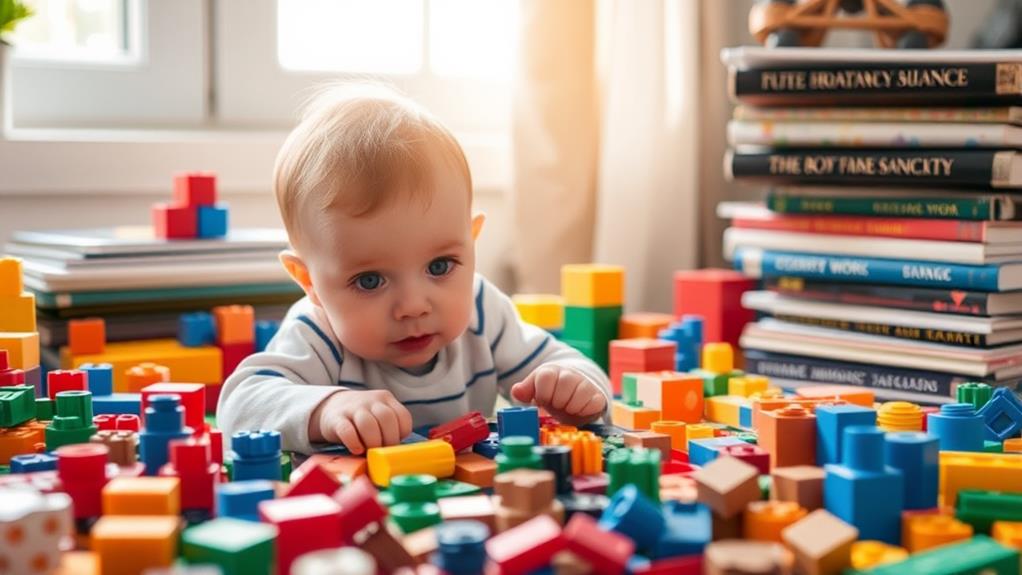
As your baby adapts to new experiences, you might notice them showing an interest in more complex concepts. This curiosity can manifest in various ways, like your little one trying to understand how things work or asking questions about the world around them.
For instance, when they play with building blocks, they might intuitively grasp the idea of balance and gravity, experimenting with different structures.
You may also observe them engaging with stories or puzzles that require deeper thinking. When they show excitement over a book that introduces new ideas, it indicates a budding ability to connect thoughts and learn abstract concepts.
Encouraging this interest is vital. You can do this by providing toys that challenge their problem-solving skills or reading stories that spark their imagination.
Simple science experiments at home can also feed their curiosity.
Strong Focus and Attention
One key indicator of your baby's potential genius is their ability to maintain strong focus and attention. When your little one zeroes in on a toy or an activity for an extended period, it's a sign that they can concentrate deeply. This focus might manifest as your baby studying a colorful block or intently watching a moving object. You might notice them becoming absorbed in what they're doing, tuning out surrounding noises or distractions.
Strong focus in infants often correlates with curiosity. If your baby shows determination to figure out how things work, that's a great sign! You may catch them repeatedly trying to reach a toy just out of reach or exploring different ways to stack blocks. These behaviors indicate not just interest but also the ability to concentrate on a single task for a significant amount of time.
Encouraging this focus is essential. Offer them varied activities that promote deep engagement, like interactive toys or sensory experiences.
You're fostering their ability to concentrate, which is a vital skill for learning and problem-solving later in life. Keep an eye on those focused moments; they could be early signs of your baby's incredible potential!
Creative Play and Imagination
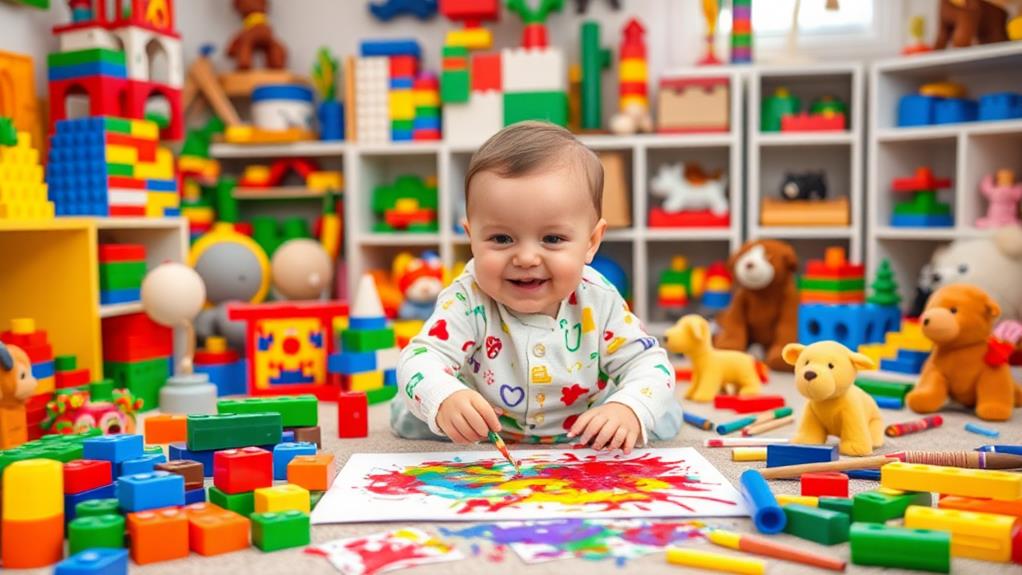
Creative play and imagination are crucial signs of your baby's developing intellect. When you notice your little one engaging in imaginative scenarios, whether it's pretending a block is a car or using a blanket as a cape, it shows they're exploring their creativity. This kind of play helps your baby learn about the world around them, express their thoughts, and solve problems in fun ways.
Encouraging creative play can be as simple as providing open-ended toys, like building blocks or art supplies, that let your child's imagination run wild. You might find them creating their own stories or role-playing with friends, both of which are fantastic for cognitive development.
Additionally, when your baby starts to mimic actions or invent stories, it's a sign they're thinking critically and making connections. These moments of creative expression aren't only entertaining; they also help lay the groundwork for future problem-solving skills and emotional understanding.

